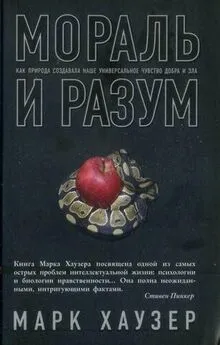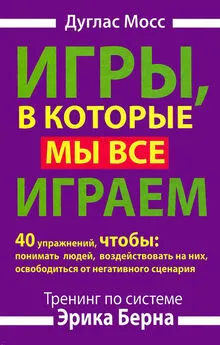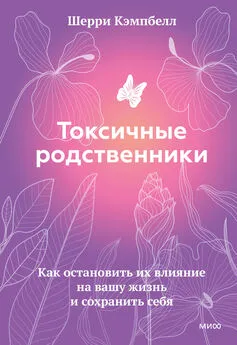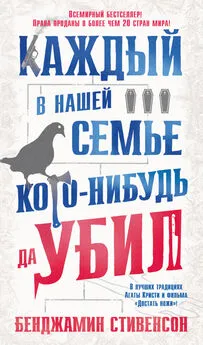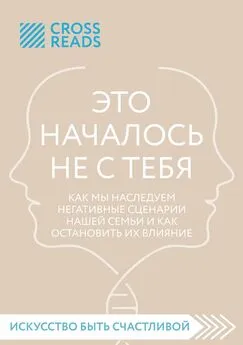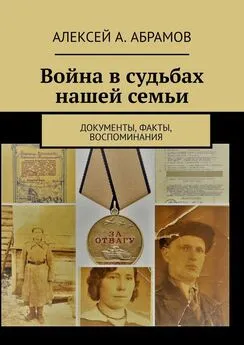Марк Уолинн - Это началось не с тебя [Как мы наследуем негативные сценарии нашей семьи и как остановить их влияние]
- Название:Это началось не с тебя [Как мы наследуем негативные сценарии нашей семьи и как остановить их влияние]
- Автор:
- Жанр:
- Издательство:Литагент 5 редакция «БОМБОРА»
- Год:2016
- ISBN:978-5-04-102313-3
- Рейтинг:
- Избранное:Добавить в избранное
-
Отзывы:
-
Ваша оценка:
Марк Уолинн - Это началось не с тебя [Как мы наследуем негативные сценарии нашей семьи и как остановить их влияние] краткое содержание
Примеры, приведенные в данной книге, взяты из жизни реальных клиентов автора. В целях сохранения конфиденциальности все имена и обстоятельства были изменены. Любые сходства с реальными людьми случайны.
Это началось не с тебя [Как мы наследуем негативные сценарии нашей семьи и как остановить их влияние] - читать онлайн бесплатно ознакомительный отрывок
Интервал:
Закладка:
20. Tori Rodriguez, “Descendants of Holocaust Survivors Have Altered Stress Hormones,” Scientific American Mind 26(2) (February 12, 2015), www.scientificamerican.com/article/descendants-of-holocaust-survivors-have-altered-stress-hormones.
21. Alisha Rouse, “Holocaust Survivors Pass the Genetic Damage of Their Trauma onto Their Children, Researchers Find,” The Daily Mail, August 21, 2015, www.dailymail.co.uk/sciencetech/article-3206702/Holocaust-survivors-pass-genetic-damage-trauma-children-researchers-find.html.
22. C. N. Hales and D. J. Barker, “The Thrifty Phenotype Hypothesis,” British Medical Bulletin 60 (2001): 5–20.
23. Bale, “Epigenetic and Transgenerational Reprogramming of Brain Development.”
24. David Samuels, “Do Jews Carry Trauma in Our Genes? A Conversation with Rachel Yehuda,” Tablet Magazine, December 11, 2014, http://tabletmag.com/jewish-arts-and-culture/books/187555/trauma-genes-q-a-rachel-yehuda.
25. Patrick McGowan, et al., “The Legacy of Child Abuse,” Headway 4(1) (2009), McGill University.
26. Jamie Hackett, “Scientists Discover How Epigenetic Information Could Be Inherited,” Research, University of Cambridge, January 25, 2013, www.cam.ac.uk/research/news/scientists-discover-how-epigenetic-information-could-be-inherited.
27. Ibid.
28. Brian G. Dias and Kerry J. Ressler, “Parental Olfactory Experience Influences Behavior and Neural Structure in Subsequent Generations,” Nature Neuroscience 17 (2014): 89–96, doi:10.1038/nn.3594, www.nature.com/neuro/journal/v17/n1/abs/nn.3594.html.
29. Hackett, “Scientists Discover How Epigenetic Information Could Be Inherited.”
30. Katharina Gapp, et al., “Implication of Sperm RNAs in Transgenerational Inheritance of the Effects of Early Trauma in Mice,” Nature Neuroscience 17 (2014): 667–69, doi:10.1038/ nn.3695.
31. Richard L. Hauger, et al., “Corticotropin Releasing Factor (CRF) Receptor Signaling in the Central Nervous System: New Molecular Targets,” CNS Neurological Disorder Drug Targets 5(4) (August 2006): 453–79.
32. Hiba Zaidan, Micah Leshem, and Inna Gaisler-Salomon, “Prereproductive Stress to Female Rats Alters Corticotropin Releasing Factor Type 1 Expression in Ova and Behavior and Brain Corticotropin Releasing Factor Type 1 Expression in Offspring,” Biological Psychiatry 74(9) (2013): 680–87, doi:10.1016/j.biopsych.2013.04.014, Epub May 29, 2013, www.biologicalpsychiatryjournal.com/article/S0006-3223(13)00361-2/abstract.
33. Max-Planck-Gesellschaft, “Childhood Trauma Leaves Mark on DNA of Some Victims: Gene-Environment Interaction Causes Lifelong Dysregulation of Stress Hormones,” Science Daily, December 2, 2012.
34. Patrick O. McGowan, et al., “Epigenetic Regulation of the Glutocorticoid Receptor in Human Brain Associates with Childhood Abuse,” Nature Neuroscience 12(3) (March 2009): 342–48, pp. 342–45, doi:10.1038/ nn.2270.
35. Hackett, “Scientists Discover How Epigenetic Information Could Be Inherited.”
36. Rachel Yehuda, et al., “Transgenerational Effects of Posttraumatic Stress Disorder in Babies of Mothers Exposed to the World Trade Center Attacks During Pregnancy,” Journal of Clinical Endocrinology & Metabolism 90(7) (July 2005): 4115–18, p. 4117, doi:10.1210/jc.2005–0550, www.ncbi.nlm.nih.gov/pubmed/15870120.
37. Samuels, “Do Jews Carry Trauma in Our Genes?”
38. Rachel Yehuda, et al., “Gene Expression Patterns Associated with Posttraumatic Stress Disorder Following Exposure to the World Trade Center Attacks,” Biological Psychiatry (2009): 1–4, esp. p. 3, doi:10.1016/ j.biopsych.2009.02.034.
39. Rachel Yehuda, et al., “Holocaust Exposure Induced Intergenerational Effects on FKBP5 Methylation,” Biological Psychiatry, August 12, 2015, www.biologicalpsychiatryjournal.com/article/S0006-3223(15)00652-6/abstract, doi: 10.1016/j.biopsych.2015.08.005.
40. Eric Nestler, MD, PhD, “Epigenetic Mechanisms of Depression,” JAMA Psychiatry 71(4) (2014), doi:10.1001/jamapsychiatry.2013.4291, http://archpsyc.jamanetwork.com/article.aspx?articleid=1819578.
41. Emily Laber-Warren, “A Fateful First Act,” Psychology Today, May 1, 2009, www.psychologytoday.com/articles/200904/fateful-first-act.
42. David Sack, MD, “When Emotional Trauma Is a Family Affair,” Where Science Meets the Steps (blog), Psychology Today, May 5, 2014, www.psychologytoday.com/blog/where-science-meets-the-steps/201405/when-emotional-trauma-is-family-affair.
43. Virginia Hughes, “Sperm RNA Carries Marks of Trauma,” Nature 508 (April 17, 2014): 296–97, www.nature.com/news/sperm-rna-carries-marks-of-trauma-1.15049.
44. Albert Bender, “Suicide Sweeping Indian Country Is Genocide,” People’s World, May 18, 2015, www.peoplesworld.org/suicide-sweeping-indian-country-is-genocide/.
45. Ibid.
46. LeManuel Bitsoi quoted in Mary Pember, “Trauma May Be Woven into DNA of Native Americans,” Indian Country, May 28, 2015, http://indiancountrytodaymedianetwork.com/2015/05/28/trauma-may-be-woven-dna-native-americans-160508.
47. Stéphanie Aglietti, “Ghosts of Rwanda Genocide Haunt New Generation,” The Sun Daily, April 12, 2015, www.thesundaily.my/news/381966.
48. Rachel Yehuda, et al., “Low Cortisol and Risk for PTSD in Adult Offspring of Holocaust Survivors,” American Journal of Psychiatry 157(8) (August 2000): 1252–59, esp. p. 1255.
49. Rachel Yehuda, et al., “Influences of Maternal and Paternal PTSD on Epigenetic Regulation of the Glucocorticoid Receptor Gene in Holocaust Survivor Offspring,” American Journal of Psychiatry 171(8) (August 2014): 872–80, http://ajppsychiatryonline.org/doi/abs/10.1176/appi.ajp.2014.13121571.
50. Judith Shulevitz, “The Science of Suffering,” The New Republic, November 16, 2014, www.newrepublic.com/article/120144/trauma-genetic-scientists-say-parents-are-passing-ptsd-kids.
51. Josie Glausiusz, “Searching Chromosomes for the Legacy of Trauma,” Nature, June 11, 2014, doi:10.1038/nature.2014.15369, www.nature.com/news/searching-chromosomes-for-the-legacy-of-trauma-1.15369; Yehuda, “Influences of Maternal and Paternal PTSD,” 872–880.52. Ibid.
53. Ibid.
54. Samuels, “Do Jews Carry Trauma in Our Genes?”
55. Sack, “When Emotional Trauma Is a Family Affair.”
56. Deborah Rudacille, “Maternal Stress Alters Behavior of Generations,” Simons Foundation of Autism Research Initiative (April 18, 2011), http://spectrumnews.org/news/maternal-stress-alters-behavior-of-generations.
57. Ian C. G. Weaver, et al., “Epigenetic Programming by Maternal Behavior,” Nature Neuroscience 7 (2004): 847–54.
58. Tamara B. Franklin, et al., “Epigenetic Transmission of the Impact of Early Stress Across Generations,” Biological Psychiatry 68(5) (2010): 408-15, esp. pp. 409–11, doi: 10.1016/j.biopsych.2010.05.036.
59. Gapp, et al., “Implication of Sperm RNAs in Transgenerational Inheritance of the Effects of Early Trauma in Mice.”
60. Ibid.
61. Ibid.
62. Ibid.
63. Katharina Gapp, et al., “Potential of Environmental Enrichment to Prevent Transgenerational Effects of Paternal Trauma,” Neuropsychopharmacology, June 9, 2016, doi: 10.1038/npp.2016.87.
64. Dias and Ressler, “Parental Olfactory Experience Influences Behavior and Neural Structure in Subsequent Generations.”
65. Linda Geddes, “Fear of a Smell Can Be Passed Down Several Generations,” New Scientist, December 1, 2013, www.newscientist.com/article/dn24677-fear-of-a-smell-can-be-passed-down-several-generations.
66. Dias and Ressler, “Parental Olfactory Experience Influences Behavior and Neural Structure in Subsequent Generations.”
67. Tanya Lewis, “Fearful Experiences Passed On in Mouse Families,” Live Science, December 5, 2013, www.livescience.com/41717-mice-inherit-fear-scents-genes.html.
68. Zaidan, Leshem, and Gaisler-Salomon, “Prereproductive Stress to Female Rats Alters Corticotropin Releasing Factor Type 1 Expression in Ova and Behavior and Brain Corticotropin Releasing Factor Type 1 Expression in Offspring.”
69. Ibid.
70. Youli Yao, et al., “Ancestral Exposure to Stress Epigenetically Programs Preterm Birth Risk and Adverse Maternal and Newborn Outcomes,” BMC Medicine 12(1) (2014): 121, doi:10.1186/s12916-014-0121-6.
71. BioMed Central, “Stress During Pregnancy Can Be Passed Down Through Generations, Rat Study Shows,” ScienceDaily, August 7, 2014, www.sciencedaily.com/releases/2014/08/140807105436.htm.
72. Yao, et al., “Ancestral Exposure to Stress Epigenetically Programs Preterm Birth Risk and Adverse Maternal and Newborn Outcomes.”
Глава 3. Семейное сознание
1. Thomas Verny and Pamela Weintraub, Tomorrow’s Baby: The Art and Science of Parenting from Conception Through Infancy (New York: Simon & Schuster, 2002), 29.
2. Winifred Gallagher, “Motherless Child,” The Sciences 32(4) (1992): 12–15, esp. p. 13, doi:10.1002/ j. 2326–1951.1992.tb02399.x.
3. Raylene Phillips, “The Sacred Hour: Uninterrupted Skin-to-Skin Contact Immediately After Birth,” Newborn & Infant Reviews 13(2) (2013): 67–72, doi:10.1053/ j.nainr.2013.04.001.
4. Norman Doidge, The Brain That Changes Itself: Stories of Personal Triumph from the Frontiers of Brain Science (New York: Penguin, 2007), 243.
5. Ibid., 47.
6. Ibid., 203–4.
7. Norman Doidge, The Brain’s Way of Healing: Remarkable Discoveries and Recoveries from the Frontiers of Neuroplasticity (New York: Penguin, 2015), 215.
8. Норман Дойдж. Пластичность мозга. Потрясающие факты о том, как мысли способны менять структуру и функции нашего мозга. – М.: Бомбора, 2018.
9. Доусон Чёрч. Гений в ваших генах. Эпигенетическая медицина и биология намерения. – М.: Весь, 2010.
10. Perla Kaliman, et al., “Rapid Changes in Histone Deacetylases and Inflammatory Gene Expression in Expert Meditators,” Psychoneuroendocrinology 40 (November 2013): 96–107, doi: http://dx.doi.org/10.1016/j.psyneuen.2013.11.004.
11. Доусон Чёрч. Гений в ваших генах. Эпигенетическая медицина и биология намерения. – М.: Весь, 2010.
12. Норман Дойдж. Пластичность мозга. Потрясающие факты о том, как мысли способны менять структуру и функции нашего мозга. – М.: Бомбора, 2018.
13. David Samuels, “Do Jews Carry Trauma in Our Genes? A Conversation with Rachel Yehuda,” Tablet Magazine, December 11, 2014, http://tabletmag.com/jewish-arts-and-culture/books/187555/trauma-genes-q-a-rachel-yehuda.
Глава 4. Метод ключевого языка
1. Annie G. Rogers, The Unsayable: The Hidden Language of Trauma (New York: Ballantine, 2006), 298.
Глава 5. Четыре сценария подсознания
1. Linda G. Russek and Gary E. Schwartz, “Feelings of Parental Caring Predict Health Status in Midlife: A 35-Year Follow-up of the Harvard Mastery of Stress Study,” Journal of Behavioral Medicine 20(1) (1997): 1–13.
2. P. Graves, C. Thomas, and L. Mead, “Familial and Psychological Predictors of Cancer,” Cancer Detection and Prevention 15(1) (1991): 59–64.
3. Дэвид Чемберлен. Разум вашего новорожденного младенца. – СПб.: Весь, 2011.
4. Michael Bergeisen, interview with Rick Hanson, “The Neuroscience of Happiness,” Greater Good: The Science of a Meaningful Life, September 22, 2010, http://greatergood.berkeley.edu/article/item/the_neuroscience_of_happiness.
Читать дальшеИнтервал:
Закладка:
![Обложка книги Марк Уолинн - Это началось не с тебя [Как мы наследуем негативные сценарии нашей семьи и как остановить их влияние]](/books/1064617/mark-uolinn-eto-nachalos-ne-s-tebya-kak-my-nasledu.webp)

